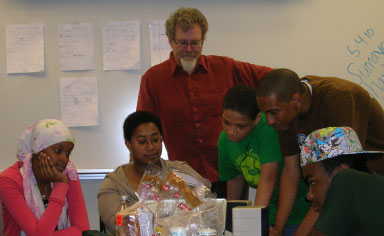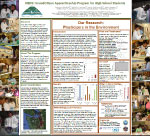The SoundCitizen Science Apprenticeship Program (SCSA) is a 2-year collaboration between SoundCitizen and COSEE OLC, the University of
Washington Institute for Science and Mathematics Education, and two non-profit youth groups in Seattle:
YMCA's
Boys Outdoor Leadership Development and
Passages Northwest. SCSA brings geosciences research and mentorship experiences to first-generation
immigrant, Latino and African American youth, ages 12-17, from urban neighborhoods in the Seattle area. SCSA is funded by the National
Science Foundation (NSF)
Opportunities for Enhancing Diversity in the Geosciences
(OEDG) program.
Along with Rick Keil, SCSA Principal Investigators include Dr. Phil Bell and Dr. Andrew Shouse, both with the
Institute for Science and Mathematics Education in the UW College of
Education. The education/scientific collaboration extends to the project management, which is handled by PhD students from the UW College
of Education Department of Learning Sciences. "SCSA was the brainchild of Rick Keil and Phil Bell, who thought the SoundCitizen context
was a really great space for introducing apprentices from underrepresented groups," says Deana Scipio, SCSA coordinator and PhD student.
Shelley Stromholt, also a PhD student in the same department, is the co-coordinator.
Eight teen apprentices were chosen for the first year of SCSA. "We reached a small number of high school kids but reached them very deeply,"
says Rick. "They were involved in every step of the scientific process." They started with defining a research question that they were personally
connected to, that had an impact on their communities, and that SoundCitizen could measure. The group chose to study three common plasticizers
that show up in plastic consumer products - Bisphenol A (BPA), Diethylhexyl Phthalate (DEHP) and Dibutyl Phthalate (DBP) - to see if they
could track the plasticizers from their community into the environment. "Their research topic is timely because our nation is evaluating how
we would like to regulate BPA," says Rick. "It's linked to lots of health issues with young children and hormonal endocrine disrupting issues
in adults."
In addition to lab and field work, the eight apprentices attended the 2010 Ocean Sciences meeting in Portland, Oregon and presented a poster.
"They were the only high school kids at the whole meeting," says Rick. "I was really proud of them." The apprentices have also provided feedback.
"The students are saying their grades in science have improved because they got a greater appreciation for what science could be used for in
their lives," says Deana. "They're excited to be doing research that people want to know about." The end of the year brought opportunity for the
teens to give the results of their project back to their communities, creating a video for YouTube and a
'zine.
"It's a freeform art approach to giving their information away on plastics and plasticizers in the environment," says Rick.



